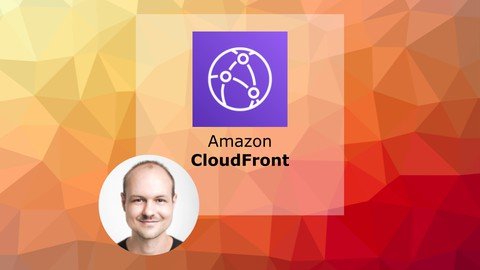
Last updated 8/2020
MP4 | Video: h264, 1280x720 | Audio: AAC, 44.1 KHz
Language: English | Size: 402.40 MB | Duration: 1h 32m
Speed up your web application with Amazon CloudFront
What you'll learn
Speed up web applications with a CDN
Debug a CloudFront configuration
Add a custom domain name to a distribution
How to add different types of backends
Requirements
General knowledge of the AWS platform
Familiarity with how web-based APIs work
Description
CloudFront is AWS's content delivery network. It consists of more than 200 edge locations around the world, which makes sure no visitor is too far from one of them. Each edge is a full-fledged data center, connected by dedicated data cables which makes the connection reliable and fast.You can take advantage of this global network with the CloudFront service. Using it, you can route your users to locations closer to them, making the waiting times between pressing enter and seeing the results a lot shorter.But CloudFront is not just about moving connections closer to users. It is also a routing engine, a proxy that sits between the visitors and the servers. You can configure path-based routing where a visitor uses a single connection to communicate with multiple backend services. This hides the complexities of an architecture consisting of multiple services, and also allows a single point of contact where you have a single point to configure modern communication protocols and all the other services benefit from it. You can use HTTP/2, IPv6, and your custom domain name even with services that do not support them.On the other hand, CloudFront is not easy to configure. Routing itself has multiple parts that can break if you are not careful, and setting up caching is a lot more complicated than what the relatively simple interface would suggest.In this course, you'll learn how to use CloudFront from the ground up. We'll start with a high-level overview of the service and the key terms that are all over the documentation and the console. Then we'll move on to the finer details of the available configuration options. The two most important and error-prone concepts, routing and caching, are discussed in-depth, as well as how to use your own domain name.During the course, you'll see the best practices and the common problems with configurations, and also how to debug CloudFront when something is not working.This course is for architects who have some experience with the AWS platform. We won't go into detail how to configure an S3 bucket or how to create an API Gateway, but no prior experience with CloudFront is necessary.
Overview
Section 1: Getting to know CloudFront
Lecture 1 What is CloudFront
Lecture 2 Benefits of CloudFront
Lecture 3 Terminology
Lecture 4 Additional terminology
Section 2: Configuration
Lecture 5 Distribution configuration
Lecture 6 Origin configuration
Lecture 7 Cache behavior configuration
Lecture 8 Routing
Lecture 9 Caching
Section 3: Specific topics
Lecture 10 Debugging
Lecture 11 S3 bucket origin
Lecture 12 Custom domain
Lecture 13 Pricing
AWS architects who want to speed up content delivery for webapps
Homepage
https://www.udemy.com/course/the-cloud-architects-guide-to-cloudfront/
https://rapidgator.net/file/a315e80e886f3c95b4863f20fd8d265b/vhccy.The.Cloud.ArchitectS.Guide.To.Cloudfront.rar.html

https://uploadgig.com/file/download/Ac3a4022298Cd884/vhccy.The.Cloud.ArchitectS.Guide.To.Cloudfront.rar

https://nitroflare.com/view/6D46AB667438907/vhccy.The.Cloud.ArchitectS.Guide.To.Cloudfront.rar
Links are Interchangeable - No Password - Single Extraction
